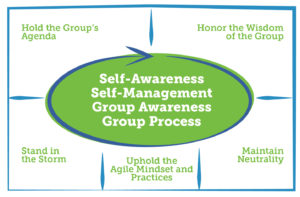Group Dynamics: How to Honor the Wisdom of the Group
When groups convene, they have the power to create something together that would not be possible from the thinking of just one or two people. Groups can see problems in new ways and craft solutions that weren’t apparent before, leveraging the dynamics of leadership and group dynamics.
But, there is a caveat. The creation of new thinking relies on a group’s ability to access their collective intelligence and navigate the intricacies of leadership group dynamics.
Everyone on the Team Has Wisdom to Gain, Wisdom to Share in leadership and group dynamics.
In theory, honoring the wisdom of the group in leadership and group dynamics is really easy. Often, both leaders and group members agree: of course the group has wisdom.
Then real life happens. Decisions need to be made. Directions need to be set.
It’s often easier to honor the wisdom of the group in principle than it is in the moment. In high-pressure moments, leaders, in particular, might be challenged by the concept of honoring the group’s wisdom in leadership in group dynamics. They would rather just make a decision on their own and tell the group what to do.
Putting Honoring the Wisdom of the Group in Leadership and Group Dynamics into Practice
Honoring the wisdom of the group in leadership and group dynamics means placing your full attention on what the group needs rather than focusing on your own needs. It starts with being deliberate about why you are meeting and how you can help invite full participation by creating and sustaining a space that will support it, taking into account the dynamics of group structure.
Here are four lessons on how to plan and design a collaborative meeting to set the group up for success.
1 Help the Sponsor Get Clear on the Level of Collaboration Needed
Factors to determine the degree of collaboration.
One way we honor wisdom in groups is by not wasting their time. Being intentional and deliberate about when collaborative decision-making is an appropriate process to meet the needs of the moment – and when someone just needs to make a decision and move forward.
Not every topic, problem, or decision needs to be collaborative. Higher complexity in decisions means a greater degree of collaboration will be important.
When you interview the sponsor and evaluate the complexity of a decision to be made, think about the scope:
- Urgency
- Risk
- Impact
- Durability
- Buy-in
2 Decide How to Decide
Not every decision lends itself to consensus and it’s okay. It often depends on the type and complexity of the decision being made.
Help the sponsor and other stakeholders agree to both the decision-making process and the boundaries of the decision prior to the meeting. Here are the types of decisions to choose from:
- Leader decides
- The leader holds veto power
- Consensus Building
- Majority Rule
Caution: Teams often decide to “majority rules” likely because reaching consensus can take more time and some teams or leaders become frustrated with the process. If you use “majority rules” as your primary way of making decisions, you might be missing an opportunity to uncover more insight and wisdom, which could improve the shared vision, increase understanding, and change the nature of the conversation and outcomes more positively over time.
3 Design Group Processes That Invite All Voices
The objective is to design a way for all voices to be heard in the room. Factors to consider in your design include:
- What is the purpose of the meeting?
- What is the desired outcome?
- How many people are participating?
- Will others be observing?
- How will you be meeting?
- How long do you have?
The primary question across the design process is: What is the highest and best use of our time together?
4 Invite Opposition – and Separate Yourself From The Process
Opposition is needed in a group in order to have an effective dialogue and, therefore, to access the wisdom of the group. Inviting opposition builds on the practices of ‘Standing in the Storm’.
There are two fundamental principles of inviting opposition:
- If opposition is not coming into the conversation organically, ask for someone who sees the topic differently.
- When opposition does emerge, don’t shut it down!
As the facilitator, it’s important for you to find ways to invite the opposition in the conversation. But as you develop your skills in relation to opposition, it’s also important to recognize when to separate yourself from the process.
Remember: you are not the process and the process is not you!

Honoring the Wisdom of the Group
Sometimes we can be really good at creating a vision for what we want: teamwork, collaboration, agility. But in execution, we can be really good at getting in our own way.
One of the greatest gifts you can bring to the group is to hold the belief that the team has the wisdom it needs, even when it feels difficult.
Even if the road is bumpy and it feels like you took a wrong exit, holding firm in this stance is one of the most empowering things you can do for a team.
Are you a facilitator in need of more wisdom?
Learn more about The Art & Science of Facilitation by visiting our website!


